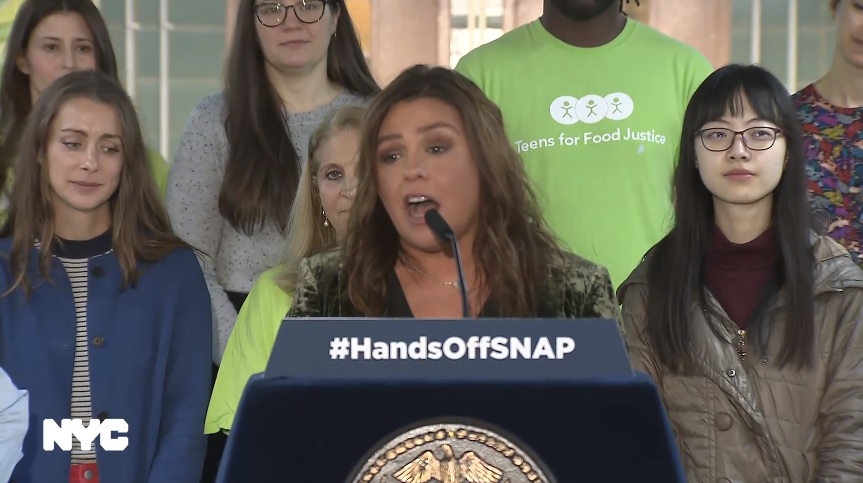 Mayor Bill de Blasio was joined by Schools Chancellor Richard A. Carranza, television host and author Rachael Ray, chef Tom Colicchio, and CEO of Hunger Free America Joel Berg today in fighting back against the Trump Administration’s proposed changes to SNAP.
Mayor Bill de Blasio was joined by Schools Chancellor Richard A. Carranza, television host and author Rachael Ray, chef Tom Colicchio, and CEO of Hunger Free America Joel Berg today in fighting back against the Trump Administration’s proposed changes to SNAP.
The changes would cut essential food assistance for more than 1 million American children, including as many as 21,000 in New York City. The Mayor pledged to sue the Trump Administration if the proposed rule is adopted.
“In the world’s richest country, it is shameful that any child goes hungry. Instead of fixing it, the Trump Administration is threatening cuts to the program that helps feed kids at home and school,” said Mayor de Blasio. “New York City has led the nation by providing free meals in school to every child, in every grade, regardless of income. And we won’t turn back. If this rule is adopted, we will take the Trump Administration to court.”
SNAP (Supplemental Nutrition Assistance Program) is a federal benefit that provides millions of low-income individuals and families across the country with a monthly supplement for food. In order to help states address differences in cost of living, they have been given the flexibility to modify income eligibility levels so as to better define ‘low-income’ based on specific circumstances within a state. This has allowed states with higher costs of living to more effectively support families trying to make ends meet. The rule change proposed by the Trump Administration would effectively eliminate this flexibility through Executive Action and cut SNAP benefits for 3 million Americans, including 47,000 New Yorkers.
In New York City, where approximately 1.5 million New Yorkers – many of them children and elderly and disabled adults – receive SNAP, SNAP eligibility also allows kids to qualify for free school lunch without another application. As part of the City’s commitment to ensuring no child goes hungry while in school, New York City began providing free breakfast and lunch for every public school student at the start of the 2017-18 school year. Every day, the Department of Education serves approximately 900,000 meals.
The Trump Administration’s proposed SNAP changes would mean that as many as approximately 21,000 children may no longer qualify for free lunch, and the DOE may no longer receive federal reimbursement these meals. In New York, people with incomes between 130% and 150% of the poverty level will lose SNAP, meaning a family of 3 that earns between $27,900 and $31,990 in one of the most expensive places in the country will no longer receive assistance feeding their family.
Most immediately, food-insecure households may have to choose between spending limited resources on food or on other needs, including rent and healthcare, with children coming to school hungry if they are not getting enough food at home.
“Healthy, nutritious meals are the fuel kids need to learn, and for too many of our kids, the meals they have in school are the only ones they eat all day,” said Schools Chancellor Richard A. Carranza. “We’ll fight to ensure that we can continue to serve free breakfast and lunch every day in all of our schools. It’s too important and, quite simply, the right thing to do.”
“Any cuts to programs that help to feed children and families are unacceptable. The de Blasio administration is committed to protecting and strengthening these programs that provide healthily and needed food to so many of our neighbors,” said Kate MacKenzie, Director of the Mayor’s Office of Food Policy.
“It is difficult to imagine a more desperate, depraved, and despicable act than trying to take food away from children whose families are struggling to make ends meet. Every day, with every new cruel proposal, the Trump Administration moves further beyond the pale,” said Department of Social Services Commissioner Steven Banks. “Our City remains committed to connecting residents with the benefits they need to provide for their families and make ends meet. New Yorkers’ livelihood and ability to access opportunity depend upon it.”
“My life is largely about sharing food. Food feeds the body, soul and little humans’ engines. It gets them to school and produces better grades and attitudes in school. School food is a vital path to food stability for at-risk children – at risk of hunger and disease associated with poor nutrition. Are we seriously incapable of understanding the importance of school meal security? If we cut off 1 million children from their food and nutritional support, especially low-income families who need it the most, we are lost, and starving for more than just-food. We are starving for our humanity,” said television host and bestselling author Rachael Ray.
“If it wasn’t bad enough that the Trump Administration was proposing taking away Supplemental Nutrition Assistance (SNAP) benefits from 3.1 million working parents, children, veterans, seniors, people with disabilities, and unemployed people nationwide, now we learn that the same policy change would deprive nearly one million low-income kids across America of school meals,” said Joel Berg, CEO of Hunger Free America, a nationwide direct service and advocacy organization based in New York City. “There is simply no way to sugarcoat this: if this proposal is allowed to take effect, U.S. children will be hungrier and farmers and food workers will have less income. This is the ultimate lose-lose proposal.”
The other major change is that people who were no longer categorically eligible would now have to meet a resource test. Even though most low-income families have very little savings, this would create churning on and off the rolls each month when resources exceed limits. For very low-income people this changes often so that families will go without food in months when they are really eligible and staff will be mired in the bureaucracy of turning benefits on and off.
Overall, reduced access to public benefits would have a significant impact on public health and wellbeing, as it can result in inadequate nutrition, reduced access to medical care, and other deficits in meeting essential needs. This adverse impact could affect families for generations to come: children who experience food insecurity are almost twice as likely to have poor physical and mental health compared to children in food-secure families, including increased risk for anemia, asthma, and depression. Additionally, research shows that:
- · Children younger than five years old whose families receive SNAP benefits experience better health, education, employment outcomes, and economic self-sufficiency than those who do not.
- · Children in SNAP households have better educational outcomes.
- · Access to nutritional food has a direct effect on learning and development.
The proposed changes would have a significant effect on the local economy. Giving individuals and families the opportunity to thrive by connecting them with benefits that help make ends meet also has a positive impact on local economies. Every $5 in SNAP benefits utilized generates about $9 of economic activity, helping neighborhood supermarkets, farmers markets, and small businesses. The proposed changes would not only take food away from children and put families’ health and wellbeing at risk, but it would also take away the economic stimulus that SNAP provides.
In September, the City’s Department of Education and Human Resources Administration submitted comments to the Trump Administration opposing the rule change. New Yorkers can learn how they can express their views on the proposed changes by November 1 here.
“The proposed changes to the federal SNAP program are nothing short of cruel and inhumane, and its far-reaching effects would be devastating to so many New Yorkers,” said Manhattan Borough President Gale A. Brewer. “I am proud to stand with Mayor de Blasio to say that we will fight this latest Trump Administration effort tooth and nail.”
“One in five New Yorkers relies on SNAP to put food on the table. It’s a vital resource that helps more than 1.6 million New Yorkers make ends meet,” State Senator Brad Hoylman said. “The Trump Administration‘s heartless proposal to take away SNAP from more than 80,000 households–impacting nearly 21,000 children–would devastate the most vulnerable in our city. I stand with Mayor de Blasio, Chancellor Carranza and the 1.6 million New Yorkers who rely on SNAP to call on the Trump Administration to scrap this proposed rule and support New Yorkers in need.”
“The proposal to remove categorical eligibility will increase rates of hunger and food insecurity in our state and across the nation. If implemented, 87,835 people across New York State will immediately lose their SNAP benefit. Currently, over 40 states have adopted some type of categorical eligibility. This is especially important in New York State where the cost of housing and dependent care is much higher than most other states in the country. New York uses this state option very effectively to ease the benefit cliff for working households; allow seniors and people with disabilities to maintain modest savings without losing SNAP food assistance; and make it easier and more cost effective to administer SNAP in our state. This proposal will prevent children from receiving healthy school meals, putting their health and learning at risk. It will also create a sicker and poorer nation by denying struggling households the food assistance they need for a healthy productive life,” said Assemblyman Andrew Hevesi.
“Time and again, this administration has chosen to punish people struggling in American instead of helping them,” said Dr. Camesha Grant, Vice President of Community Connections and Reach at Food Bank For New York City. “New Yorkers of all ages, from young children to seniors, rely on SNAP so that their families don’t have to make impossible choices between food, housing and other essential items. In serving every corner of New York City, we’re able to witness firsthand the importance of SNAP for families in need. SNAP is the first line of defense against hunger, but when those resources are attacked, under-resourced food pantries and soup kitchens in the deepest pockets of poverty are forced to serve more people in greater need. We must all raise our voices to call for just and humane policies.”
“City Harvest opposes the Administration’s proposed rule restricting categorical eligibility for the Supplemental Nutrition Assistance Program (SNAP). This policy would be devastating to millions of working families in New York City and across the country who are struggling to make ends meet, and to their children who rely on free school meals as the only complete meals they may get all week. City Harvest is working hard every day to rescue food that would otherwise go to waste and deliver it to hundreds of community food programs across the five boroughs. But the need in our city and around the country is too big to meet without SNAP–which provides 8 meals for every 1 meal that the Feeding America network, of which we are a member, provides. We urge the Administration to withdraw this rule immediately,” said Jilly Stephens, Chief Executive Officer of City Harvest
“The White House’s proposal to change SNAP eligibility would have immediate and long-lasting consequences for kids in New York. More than 130,000 New Yorkers who live in families with kids and currently receive SNAP would lose their benefits. And, nearly a million children nationwide would lose automatic access to free school meals. This is a short-sighted policy that delivers a one-two punch of lost meals both at home and at school. We stand with New York City’s leadership today in opposing this rule,” said Rachel Sabella, Director of No Kid Hungry New York.
“SNAP provides a critical safety net for food-insecure low-income New Yorkers and has the added benefit of supporting our local food economy. Any efforts to cut back SNAP or further restrict eligibility would hurt the most vulnerable New Yorkers, putting their health at risk,” said Nicholas Freudenberg, Distinguished Professor of Public Health and Director, CUNY Urban Food Policy Institute.
“The West Side Campaign Against Hunger (WSCAH) community of 22,000 hungry New Yorkers work hard every day to feed their families with the support of an ever-shrinking, meager, safety net. In a time of ever-deepening inequality, the unnecessary cuts to SNAP will deepen the poverty of our friends, neighbors, and fellow community members. WSCAH and many other groups across the nation, under-resourced and overburdened, will continue to do what it takes to support our community when our federal government will not. This will not be easy, but making sure all New Yorkers have access to healthy food and social supports is not a choice, it’s our mission,” said Chef Greg Silverman, Executive Director of West Side Campaign Against Hunger.
”President Trump seeks to reverse advances in SNAP eligibility that take into account real-life expenses of many food-insecure households,” said Liz Accles, Executive Director, Community Food Advocates. “This cruel action would have a cascading effect with a particular impact on seniors, children and their families. Denying families SNAP literally takes food out of the mouths of hungry people. It will also impact school meal eligibility at a time when more students are participating and as learn about the significant increase in reading and math scores of children participating in New York City’s universal free school lunch program.”
Linda Bopp, Executive Director of Hunger Solutions New York, said, “SNAP is the first line of defense against hunger, and is utilized by more than 2.6 million New Yorkers. These proposed cuts would be devastating to food-insecure families, and would worsen hunger in New York and across the country.”
“These cuts to SNAP are being proposed with malicious intent and will hurt children, our most vulnerable seniors and working people,” says Michael Hurwitz, GrowNYC Greenmarket Director. “Moreover, the small farms we work with rely on this crucial income source for their farms’ long-term viability.”
“The Administration’s proposed SNAP cuts would have a ripple effect on children’s access to nutritious food – first at home and then at school. With these cuts, students in New York state stand to lose free school breakfasts and lunches. This is unacceptable. Hungry students can’t learn – they have difficulty focusing and concentrating higher incidence of mental health disorders and increased behavioral issues. All children deserve to have the nutritious foods they need to learn and thrive,” said Dr. Pamela Koch, EdD, RD, Research Associate Professor and Executive Director, Laurie M. Tisch Center for Food, Education & Policy, Program in Nutrition, Teachers College, Columbia University.
“At Teens for Food Justice, we firmly believe that sufficient access to affordable and quality food, which supports a healthy life, is a basic human right. As an organization built in New York City, where over a million residents reside in ’food desert’ communities, we see first hand every day how SNAP is the program that enables and ensures over 21,000 children and teenagers are able to participate in a healthy lifestyle. As we work together as a community to develop and empower the next generation of New Yorkers, it is paramount that we consider the long-term detrimental effects of cutting SNAP and leaving 80,000 city households without a secure healthy option for dinner,” said Kathy Soll, CEO of Teens for Food Justice.
“Food insecurity, poverty, and poor nutrition is the catalyst for negative consequences in the health and well being of children and adults,” said Stephen Grimaldi, Executive Director of New York Common Pantry. “Without programs like SNAP, educational performance falters, as does health and economic outcomes. Healthy Pantry programs, like those we offer at NYCP, coupled with SNAP, allows families the flexibility to apply a little more of their income to other monthly expenses while improving their future outcomes, including stabilization. SNAP puts money into the city’s economy as well – $1.79 for every $1.00 of SNAP. Losing SNAP will absolutely devastate thousands in NYC.”
Become a Harlem Insider!
By submitting this form, you are consenting to receive marketing emails from: Harlem World Magazine, 2521 1/2 west 42nd street, Los Angeles, CA, 90008, https://www.harlemworldmagazine.com. You can revoke your consent to receive emails at any time by using the SafeUnsubscribe® link, found at the bottom of every email. Emails are serviced by Constant Contact








